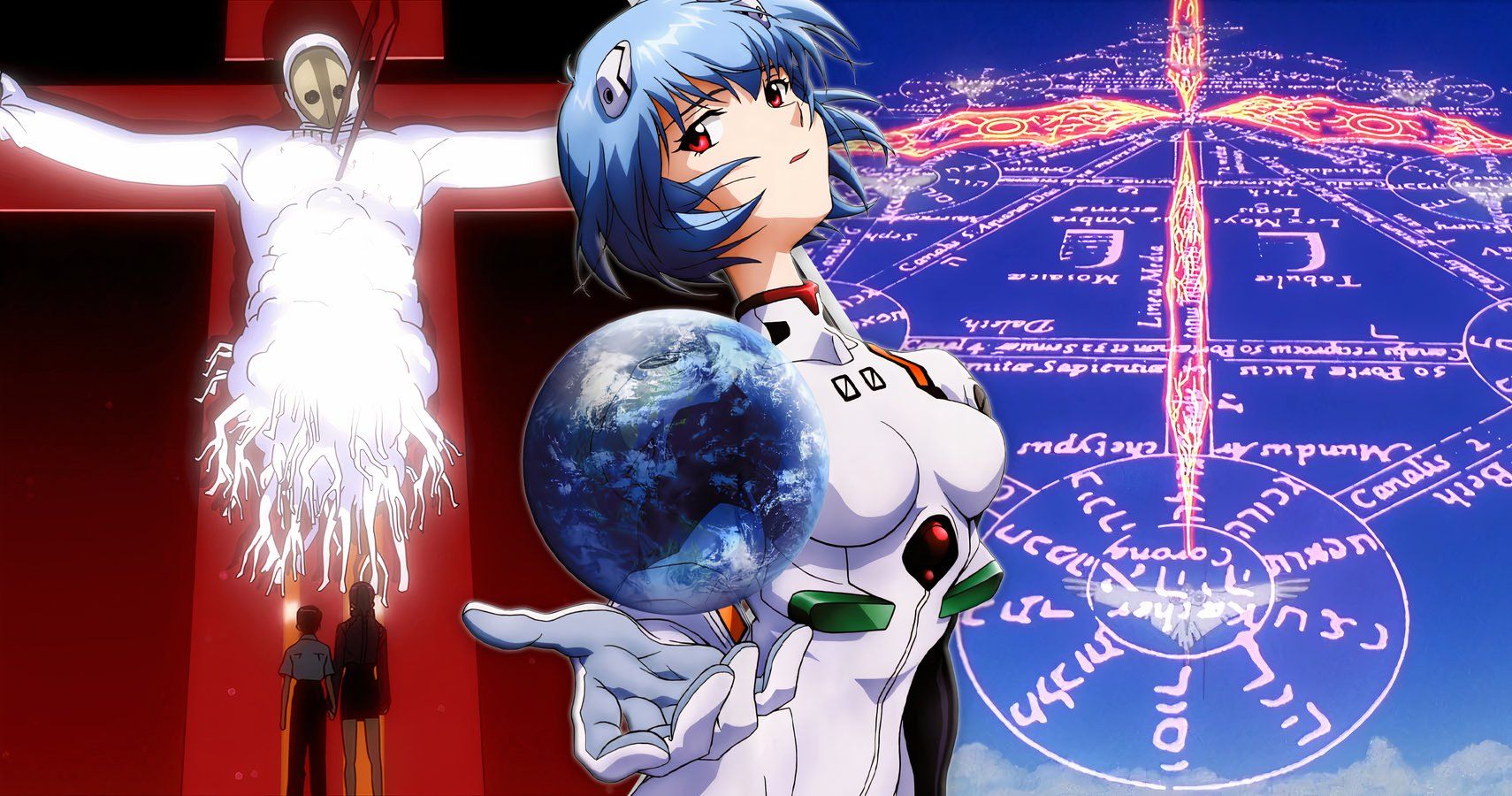Summary
- Neon Genesis Evangelion is filled with religious symbolism, sparking intense debates among fans and scholars alike.
- From crosses to biblical names, the anime explores themes of sacrifice, salvation, and the human condition.
- While creators mention aesthetic reasons for the symbolism, viewers interpret the imagery in various ways, adding depth to the series.
Neon Genesis Evangelion is one of the most famous and critically acclaimed anime series ever released. Created by the legendary Studio Gainax and written by anime visionary Hideaki Anno, the show has firmly established itself as a must-watch series for fans of the anime medium. Even today, years after its initial release, the show still sparks plenty of debate, with fans and academics offering their takes on the show's themes and story. One of the most hotly debated Neon Genesis Evangelion topics is its use of religious symbolism. But what does this symbolism mean, and why was it included in the beloved series?
It is easy to see why fans heavily debate the meaning of the religious symbolism in Neon Genesis Evangelion, as the show features a staggering number of religious references. Some scenes feature multiple bits of religious symbolism at once, allowing eagle-eyed viewers to easily to come up with unique readings of the show's storyline and overall message.
Neon Genesis Evangelion Has A Massive Amount of Religious Symbolism
The most noticeable religious reference in Evangelion is the Christian cross, as it is a constant sight in the series. For example, Sachiel's particle beam forms a cross-shape, Zeruel's particle beam causes cross-shaped explosions, dying angels combust into crosses, and Misato Katsuragi frequently wears a cross pendant. On top of this, crosses are often built into the environment or formed via the creative use of light and shadow. For example, Shinji is seen walking down a path that resembles a cross when viewed from above in the fourth episode. Later, the shadow of a cross is seen behind Gendo Ikari when he discusses humanity's evolution. Even more notably, several important establishing shots feature Christian churches with prominent crucifixes on their spires.
Notable Religious References In Evangelion
- Crucifixes
- The Dead Sea Scrolls
- The Fruit of Knowledge
- Angels
- Magi
Plus, there are many overt references to the crucifixion in the show. One of the most in-your-face ones is Lilith, who is seen attached to a Tau cross (also known as Saint Anthony's Cross) in episode 15. This image is also seen in many other places, including episode 18, where Eva-03 is airlifted via a cross-like mechanism that holds the robot in a crucifixion-like pose. Of course, the most famous use of this imagery comes in End Of Evangelion, where Unit-01 gets crucified during the triggering of Third Impact. This is followed by a scene where two Mass Produced Evas are seen holding a crucifix pose while Shinji chokes Asuka.
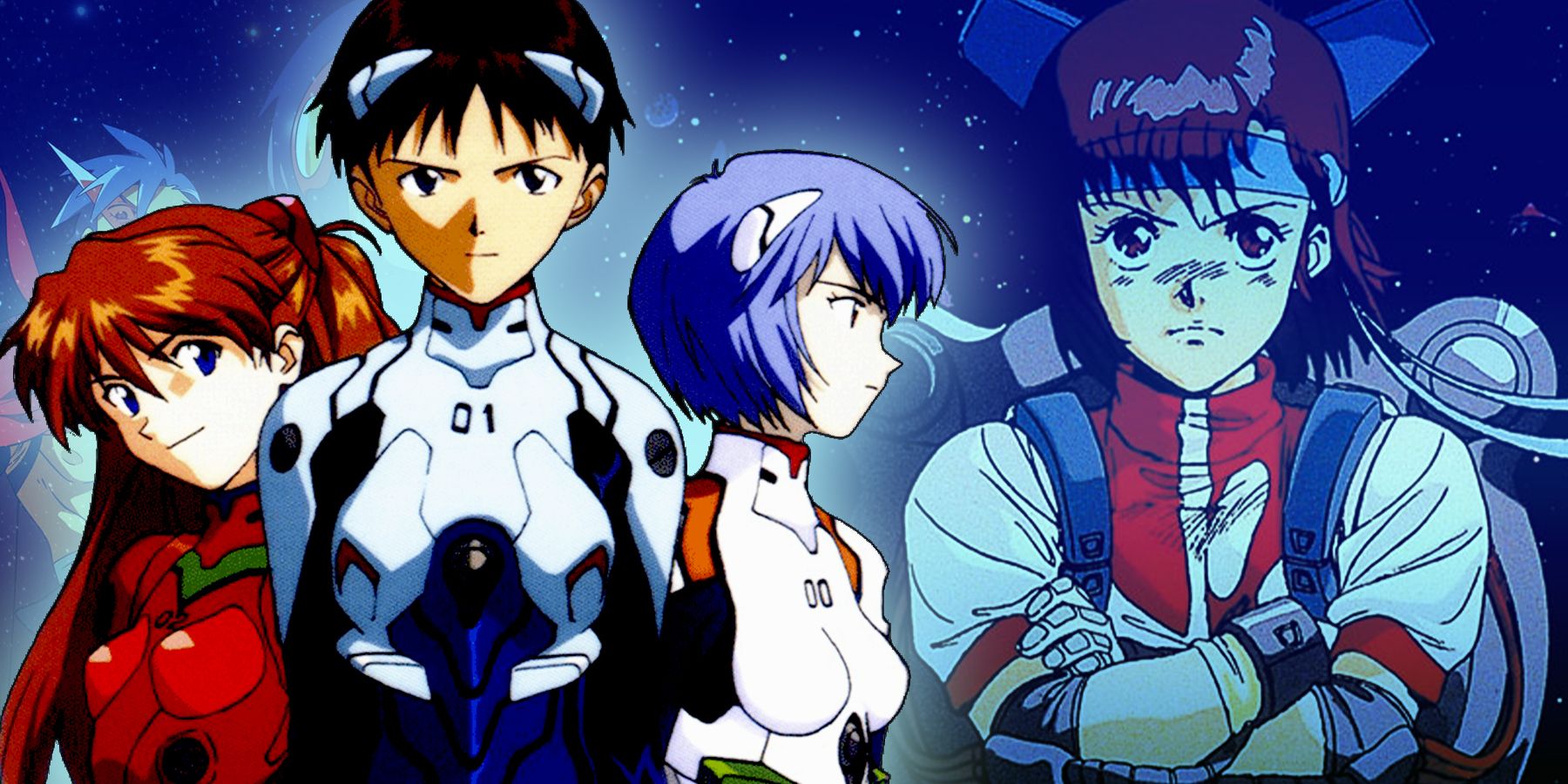
15 Anime To Watch If You Like Neon Genesis Evangelion
Neon Genesis Evangelion is a classic mecha anime with a dark twist. Fans should check out these anime with similar vibes & themes.
On top of this, many notable objects and characters have names that relate to religion. This is best seen with the Angels, as most of them have names that link to religion in some way. The most obvious ones are Adam and Lilith. Adam shares its name with the first man created by God in Christian mythology. Lilith is named after a legendary figure from Jewish folklore.
Lilith was Adam's first wife, but she was expelled from the Garden of Eden as she refused to be subservient to Adam. On top of this, the iconic Spear of Longinus references the Lance of Longinus (also known as the Holy Spear,) the weapon used to pierce Jesus' flesh while he hung on the cross. In addition, the Magi supercomputers are named Melchior, Balthasar, and Casper, after the three wise men who visited Jesus on the day of his birth.
Shinji Is Often Viewed As A Christ-Like Figure, Embodying Jesus' Morals And Ideals
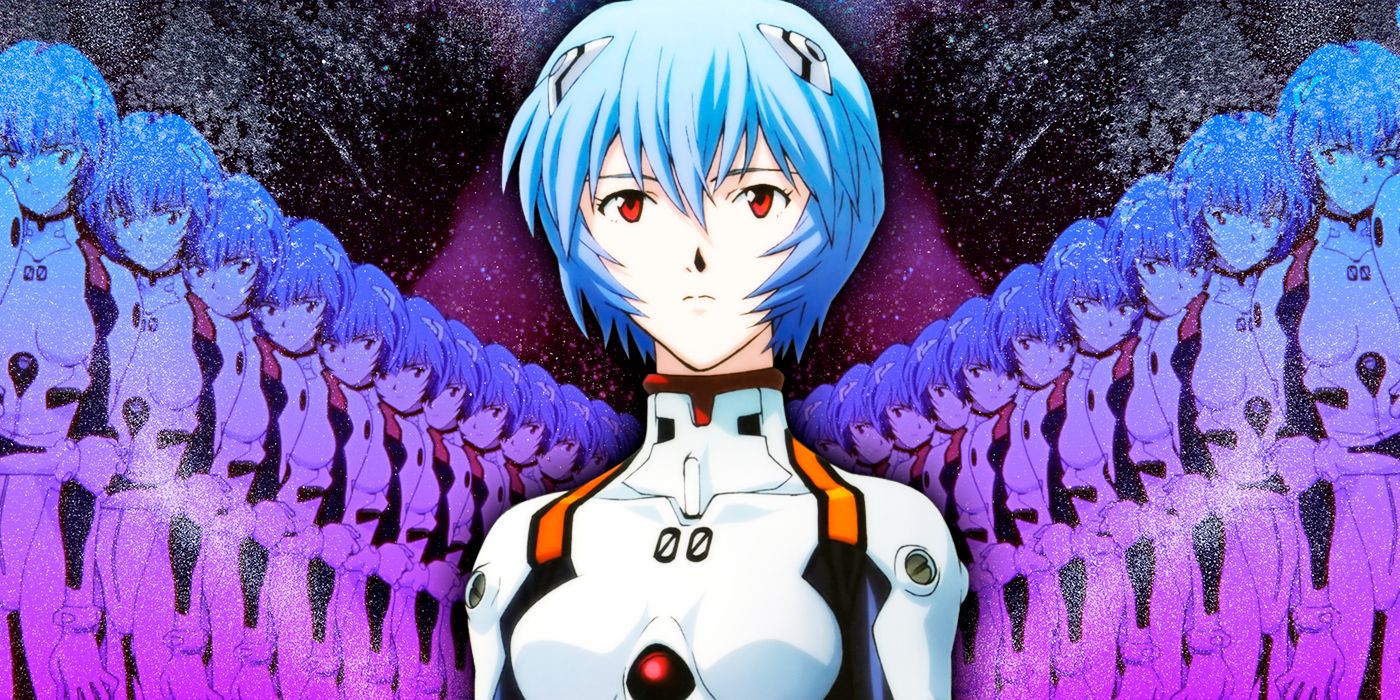
Rei Ayanami's Backstory & Fate in Neon Genesis Evangelion, Explained
Rei Ayanami is one anime’s most iconic figures, yet her true nature and fate at the end of Neon Genesis Evangelion are the series’ greatest enigmas.
With this massive amount of religious symbolism, it's no surprise that many fans and scholars have deeply analyzed Evangelion using a spiritual lens. One of the most common readings argues that Shinji is a figure who embodies the ideals of Jesus. During Evangelion, Shinji sees the dark side of humanity and the struggles people go through. When given the final choice between allowing humans to become one pure being through instrumentality or letting humans continue as individual beings despite the risk of suffering, Shinji chooses to let people remain individual.
Through his immense sacrifice, he declares there is still hope for humans despite their flaws and imperfections. By making this decision, Shinji offers a way for humans to gain salvation in the future. This parallels how Jesus formed a new covenant with humanity when he died on the cross. This covenant accepted humans' capacity for sin while offering a way forward. One that gives people a way to cleanse themselves of their misdeeds, allowing them to eventually get to heaven despite their flawed nature.
Other readings argue that Evangelion looks at what it means to be human in a world that is becoming increasingly artificial, with Shinji's quest being a metaphor for people trying to retain their souls in a world that is determined to corrupt them or stamp them out. They argue that the often disjointed religious references, especially those employed by Seele and NERV, act as a metaphor for this corruption.
This is a demonstration of how easily people can be misled and drawn into the web of false prophets. On top of this, many analysts use these references to tie Evangelion into other religious or spiritual practices. Most notably, people often link Evangelion's imagery to Gnosticism or Kabbalah, arguing that the show recreates stories from these faiths.
Neon Genesis Evangelion's Religious Symbolism Might Mean Nothing
Hideaki Anno Has Given Numerous Answers About Its Meaning Over The Years
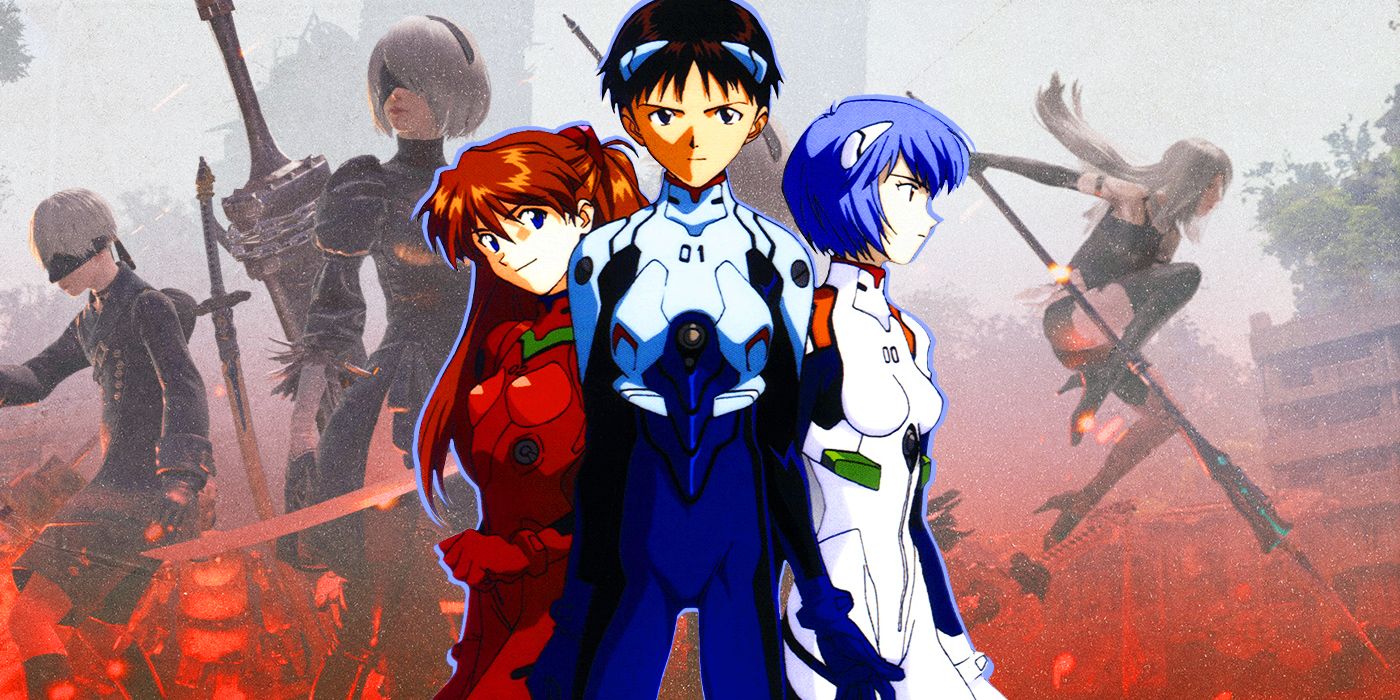
Popular Square Enix Game's Story Is "Pretty Much Just a Retelling of Evangelion"
NieR: Automata was one of the many inspirations for the upcoming Stellar Blade, but both games drew heavily from anime like Neon Genesis Evangelion.
However, while the show is packed with religious symbols and things that can be read as metaphors for religious concepts, many argue that Evangelion's religious symbolism doesn't have a meaning and was only included because it looks good. This argument is backed up by several Studio Gainax and Evangelion team members who have frequently said that the symbolism was included for aesthetic reasons rather than symbolic ones.
One such person is Kazuya Tsurumaki, the assistant director for Evangelion. At a 2001 Otakon panel, after being asked to explain the show's use of cross imagery, he is reported to have said:
There are a lot of giant robot shows in Japan, and we did want our story to have a religious theme to help distinguish us. Because Christianity is an uncommon religion in Japan, we thought it would be mysterious. None of the staff who worked on Eva are Christians. There is no actual Christian meaning to the show, we just thought the visual symbols of Christianity look cool. If we had known the show would get distributed in the US and Europe we might have rethought that choice.
In an interview with the German anime magazine FUNime, Tsurumaki reiterated this point, telling the magazine that they included the cross iconography as they believed it made the show "exotic and mysterious" and that "we thought the mix of science and religion would make the series more interesting."
And it isn't just Tsurumaki who claims this. Toshio Okada, the president of Gainax between 1984 and 1992, claimed that Hideaki Anno had never read the bible and had instead "picked out a few interesting technical terms" during a 2003 talk at MIT. During this talk he also claimed that the team did the same with psychology books, picking out intriguing terms and concepts without diving deeply into them.
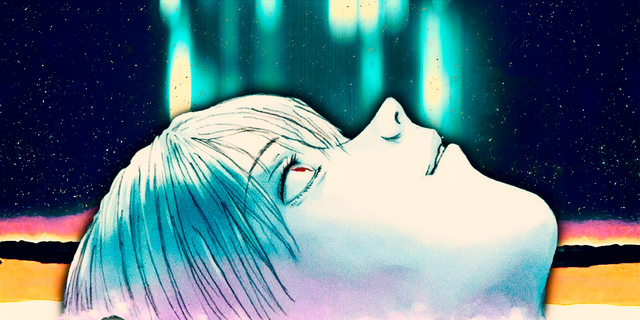
RETRO REVIEW: The End of Evangelion
Neon Genesis Evangelion's reinterpreted finale, The End of Evangelion, hits theaters for a limited time, offering a new way to see a classic.
Hideaki Anno doesn't deny this, and many of his comments during interviews and discussions back up this argument. The September 1996 issue of Animerica featured a write-up of Anno's panel at Anime Expo 1996, where he discussed his religious beliefs in response to a question from an attendee. Anno said:
"I don't belong to any kind of organized religion, so I guess I could be considered agnostic. Japanese spiritualism holds that there is 'kami' (spirit) in everything, and that's closer to my own beliefs."
That same year, Anno was interviewed in Newtype magazine. In this interview, Anno described Evangelion as a jigsaw puzzle. One that doesn't have a single correct answer or interpretation. Anno echoed this statement in 1997 when he was interviewed in French anime magazine Animeland. During this interview, Anno was asked if the studio received any complaints about their use of Christian symbology, with the interviewer noting that the Angels in Evangelion were evil rather than good. Anno responded to this question by saying:
I don't know much about the Christian religion, and it wasn't my intention to approach it or to criticize whatsoever.
In 1999, Anno appeared on an NHK series titled Welcome Back for an Extracurricular Lesson, Sempai! In this series, famous people return to their primary schools and teach the kids there a lesson, usually about their current area of expertise. In this episode, Anno does a question-and-answer session with a group of children who are working on animation projects. One of these children asks Anno why he decided to call the mechs Evangelion, only for Anno to respond:
It comes from a Christian word meaning the Gospel, and it's supposed to bring blessings. It actually has to do with Greek. I chose the name because it sounds complicated.
In a later round table interview with Komatsu Sakyô that was printed in SF Japan MILLENNIUM:00, Anno further stressed that the religious symbolism wasn't intentional, responding to Sakyô's questions about the show's themes by saying that the Christian elements were convenient material for structuring the story, even telling Sakyô that he made up the eschatological elements of Evangelion as he went along. Later in the interview, Anno caps off this argument by saying that he "borrowed" elements from Christianity to make his point about the destination of humanity, further confirming the idea that Evangelion's Christian images are not meant to be read as one single metaphor.
Anno explained this further in a 2000 interview "with a member of Waseda University". During this interview, Anno noted that he quickly researched things related to Christianity using "dictionary-like" books before adding that many elements of Evangelion are just symbols that don't carry the series' complete meaning individually. Instead, the show is meant to be viewed as a whole, further reinforcing the idea that the religious references are just a shorthand Anno used to make a grander point rather than an attempt to deliver a holy message.


